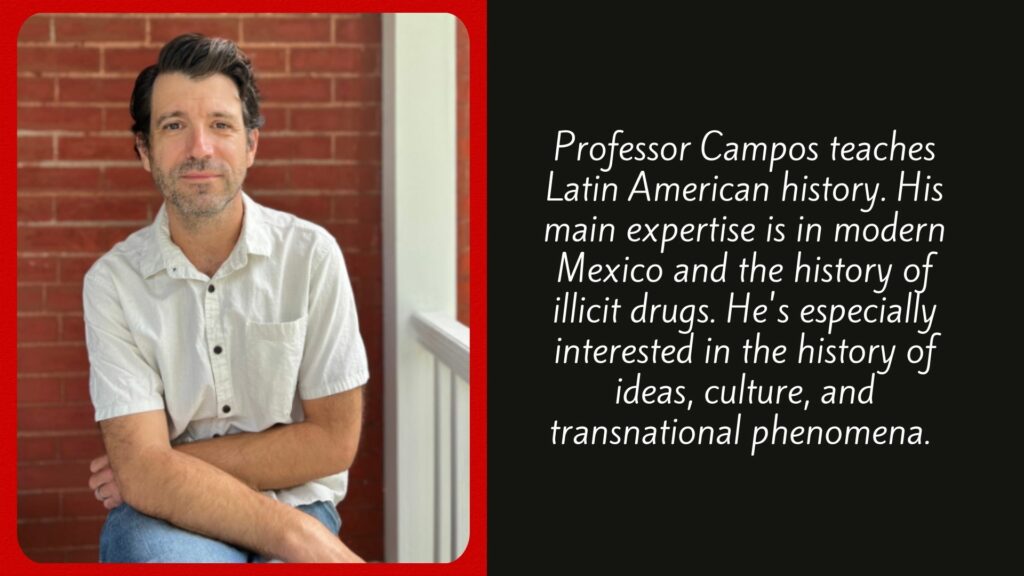
- YouTube: https://tinyurl.com/yc7nu4py
- Apple podcasts: https://tinyurl.com/3nf22tz4
- Spotify: https://tinyurl.com/yc4wxbpu
- Pocketcasts: https://tinyurl.com/d3skwndf
- Substack: https://tinyurl.com/2s38ekj5
What inspired you to pursue a career in history, and how did you develop your specific research interests?
I have always loved history, and in college, I learned that I really loved historical research. I got interested in drug history through my interest in transnational history. Transnational history involves phenomena that cross borders in an unofficial or under-the-radar capacity in contrast to INTERnational history, which deals with things like treaties, official diplomatic relations, etc. I was fascinated by how influence can quietly move over borders and change the course of events. This led me to drugs, which were an ideal topic for exploring transnational processes in action.
How do your courses contribute to students’ understanding of the relationship between law, history, and society?
Well, to understand the modern history of drugs, you have to understand a lot about law and policy. Without prohibitionist drug laws, we would not have the massive illicit markets that have turned illegal drugs into one of the most lucrative industries (licit or illicit) in the world. So we spend a lot of time examining the origins of these laws in HiST2067, “Drugs in the Americas and in Global Perspective, “HIST2068: “Home Grown: The History of Marijuana in Mexico,” and HIST2167, “Drugs and Other Addictions Since 1980.”
Can you share a specific example from your research or teaching illustrating how legal institutions, laws, or norms have shaped cultural or social change in a particular historical context?
Prohibitionist drug laws in the United States, Mexico, and throughout the world have fueled the creation of extraordinarily lucrative drug markets that have had a massive social and cultural impact in Latin America. In Mexico, huge numbers of people are employed by these illicit industries, these markets have helped to erode the very rule of law there, and, from a cultural perspective, many ordinary Mexicans celebrate the exploits of the big narcotraffickers in popular culture from pop music to movies to religion.
How do you incorporate interdisciplinary approaches, such as political, economic, or cultural perspectives, into your research and teaching, especially in relation to legal systems, norms, and procedures?
A lot of research into drugs is produced by social scientists rather than historians. Thus, to understand drug markets, it helps to draw on the work of economists. To understand drug cultures, it helps to draw on the work of sociologists and anthropologists. To understand drug politics, it helps to draw on the work of political scientists.
What challenges do historians face when studying the impact of legal systems on different societies, and how do you address these challenges in your work?
Legal systems play out within cultural contexts and thus you can’t understand legal systems historically without understanding their cultural context. You can address these challenges by broad learning about the societies in question.
What do you find most rewarding about teaching and mentoring students in your courses?
I like seeing how excited students get when they begin to recognize they are learning A LOT about a topic of extraordinary contemporary significance.
In what ways do you see your course preparing students for careers or further study in fields related to law, history, or public policy?
Historical study and research require the fine-tuning of skills that are invaluable to countless other careers: learning to read challenging documents closely and critically, organizing and impartially assessing large amounts of evidence, synthesizing all of that evidence into a coherent explanation or argument, and communicating those explanations in both writing and speech.
What are your favorite undergraduate courses to teach, and why are they your favorites?
I love teaching all my drug classes because I designed them around the most fascinating questions that animate my own research.
Courses taught that fulfill requirements in the Law, History, and Society Major Concentration:
- Hist 1020: Latin American History
- Hist 2067: Drugs in the Americas and in Global Perspective
- Hist 2068: Home Grown: The History of Marijuana in Mexico
- Hist 2067: Drugs and Other Addictions Since 1980
- Hist 4167: Drugs and Addiction Since 1980 in the Americas and in Global Perspective
